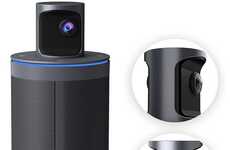
Microsoft Launches Its First Smart Camera for Meetings, the Surface Hub 2
Niko Pajkovic — March 16, 2022 — Tech
Microsoft has announced the launch of the Surface Hub 2, its first AI-powered camera designed specifically for the hybrid work environment. The new device will support automatic framing and deliver a wide field of view and image correction features, all of which are intended to improve video-conference meetings.
In terms of specs, the Surface Hub 2 comes equipped with a 12-megapixel sensor, a 136-degree field of view, and 1teraflop of computer power. The extra power is being combined with algorithms to automatically compensate for visual distortions and angle corrections.
“Surface Hub 2 Smart Camera reframes, adjusts lighting, and enables incredibly wide angles of view, all without any warping, distortions, or depth-of-field issues that might otherwise limit what is visible,” explains Steven Bathiche, corporate vice president of Windows and Devices at Microsoft.
Image Credit: Microsoft
In terms of specs, the Surface Hub 2 comes equipped with a 12-megapixel sensor, a 136-degree field of view, and 1teraflop of computer power. The extra power is being combined with algorithms to automatically compensate for visual distortions and angle corrections.
“Surface Hub 2 Smart Camera reframes, adjusts lighting, and enables incredibly wide angles of view, all without any warping, distortions, or depth-of-field issues that might otherwise limit what is visible,” explains Steven Bathiche, corporate vice president of Windows and Devices at Microsoft.
Image Credit: Microsoft
Trend Themes
1. AI-powered Work Cameras - AI-powered smart cameras designed for hybrid work environments, which enable automatic framing, image correction, enhanced field of view, and computer power for video conferencing meetings.
2. Automatic Framing Technology - The rise of automatic framing technology to improve more personalized and dynamic video conferencing experiences.
3. Wide Field of View - The trend towards wide field of view to provide panoramic view of participants in video conferencing meetings.
Industry Implications
1. Technology - The technology sector could benefit from the innovative applications of AI-powered cameras that create a better video conferencing experience.
2. Remote Work - Remote work industries, especially those that rely on teleconferencing, can harness AI-powered camera technology to make video conferencing meetings more immersive and dynamic.
3. Education - The education sector can adopt this trend to enable remote learning with enhanced video conference experiences, resulting in better and more immersive lessons.
2.9
Score
Popularity
Activity
Freshness
















